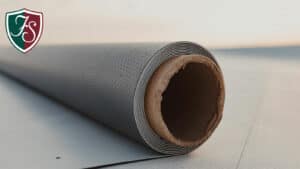
PVC is perfect for low-slope roofs wherever they occur.
Although PVC is a common choice for flat and low-sloped roofs in the Seattle and Puget Sound area, it is not a well-known or understood roofing material. As the neighborhood specialists in roofing, we frequently receive inquiries concerning PVC roofing. We’ll get straight to it and address some of your frequently asked PVC questions while also outlining the advantages of PVC for flat or low-sloped roofs.
1. What is a PVC Roof?
PVC, a plastic polymer, is a common component of many building materials, including doors, windows, plumbing pipes, and roofing membranes. This plastic polymer comes in both flexible and rigid varieties. Because PVC roofing is flexible, roofers can more easily install the material around roof penetrations such as chimneys, vents, and skylights that are found on many houses in the Puget Sound region. The flexible plastic is strengthened by the addition of a fiber backing known as the skrim, making it the ideal material for longevity in residential applications. The membrane is UV reflective and puncture and tear resistant, so UV exposure won’t cause it to degrade. PVC is sealed by welding the seams where the materials meet. Hot air is used for this. Here in the Pacific Northwest, when welded, PVC produces a waterproof barrier that offers superior protection and can easily last 20 years.
2. Why Does Four Seasons Roofing Choose PVC?
Below are some of the main reasons why Four Seasons Roofing selects PVC for residential roof installation on low slope roofs in Puget Sound.
- PVC is a far more durable roofing material than other low-slope materials. It is also made to be tear- and puncture-resistant and can withstand ponding water. It also resists UV ray deterioration.
- This resilience is perfect for the Northwest, where yearly precipitation can reach 78 inches and periodic storms frequently dump huge branches, pinecones, and other debris onto your roof
- A PVC roof requires much less maintenance than other types of roofing materials.
- PVC can last up to 20 years with proper maintenance.
3. Is PVC Roof Installation Year-Round at Four Seasons Roofing?
Four Seasons Roofing is renowned for its year-round roofing capabilities. So, “Yes, we do install some PVC year-round.”
We take weather and temperature into consideration when installing PVC because those variables affect the material more than they do for other materials we use. PVC can be installed at any time of the year as part of a project we call a combined roof. This means that the roof has flat portions that call for specialist PVC as well as some pitched areas that use more conventional materials. With our fully integrated repair program, we can also repair PVC at any time of the year. For a successful installation that will last for years, we restrict the size of our installations during the colder and rainier months.
4. Are PVC Roofs Designed for Residential Use?
You may have heard that PVC is unsightly or that it may only be used in commercial settings. Well now, those things are simply untrue. Here in the Northwest, PVC is by far the best solution for low slope residential applications. PVC is a stylish and distinctive material that will increase the value and curb appeal of your property when it is installed by a qualified roofing contractor with experience in PVC roofing systems, such as Four Seasons Roofing.
Call our office right away to find out more about PVC or to arrange an estimate for replacing your flat roof!
